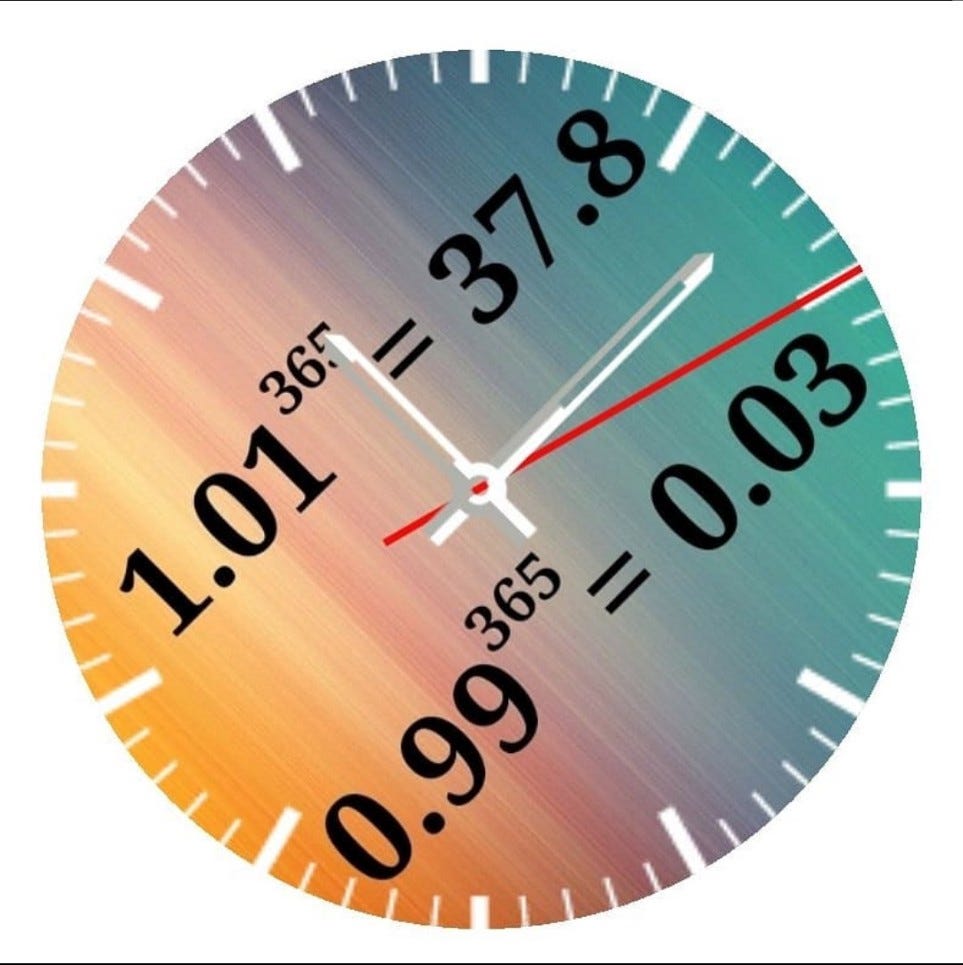Today, do a little bit more than you did yesterday. Stretch yourself just a little bit more, you won’t break.
Back in primary school days, we learned about simple and compound interest rates. Investors prefer compound interest rates as these result in exponential growth of their assets and their wealth.
This same analogy applies to learning and improving.
“Knowledge and productivity are like compound interest. The more you know, the more you learn; the more you learn, the more you can do; the more you can do, the more opportunity. I don’t want to give you a rate, but it is a very high rate. Given two people with exactly the same ability, the one person who manages day in and day out to get in one more hour of thinking will be tremendously more productive over a lifetime.” ~ Richard Hamming
If a picture is worth millions of words, then a math equation could be worth millions of pictures (or nearly so). The image succinctly explains what happens when we take on the challenge of regularly and consistently improving on our last performance.
If you decide to always do (on a regular basis) just a little bit more than what you are capable of doing (daily, as in this picture example), at the end of one year, you will be immensely better than what you were at the beginning. Only one word will suffice to describe the resulting transformation. Superhuman! No, you won’t become exactly superhuman. Your results will increase by several orders of magnitude beyond your starting capabilities.
Please don’t say it doesn’t work. It works! The real challenge is finding the reserve of self-discipline and focus to stick to any one improvement point on a regular basis for as long as it takes to reach the next level of outstanding performance.
On the flip side, this rule also works in the reverse. If you shirk the challenges and dubiously prefer to always do less than you are capable of doing (each subsequent time you do it), it’s just a matter of time, all your previous skills and abilities will decay to zero. Ponder over that, cumulative zero ability!
In other words, a person who started with great potential for reaching as high as the stars end up nowhere because he never borders to put in any effort.
Following the graphic equation and keeping on at it steadily and regularly, how many days will it take to double your capability? Just 70 days.
Melodramatic as it is, the graphic explanation of the math surely captures and points out the lofty heights we all potentially could reach if we individually imbibe the habit of always putting in a bit more effort into our worthwhile pursuits every time we are going about our daily businesses.
So, wake up, step up your acts, and soar. And don’t forget the key is regular and deliberate practice.
How do you make this math work in your favor? Here are three steps:
Avoid Procrastination. Yes, you have heard it before but you can’t overhear it. If you keep on putting off till tomorrow what you can do today, the day will come when you discover too late that you have put off one more thing too many. On that day, you will find that life has just slipped through your fingers. All of it and all because you procrastinated your life away.
Back in my college days, one of my friends Segun Ogunyeye used to pep us, his fellow students, up with talks before our professors came in for their lectures. Thirty years later and still counting, his quip still rings in my mind, “By the road of, I’ll do it bye and bye, a man gets to the town of “No Achievement”. Don’t you agree that it is as valid today as when I first heard it over three decades ago?
2. Stretch yourself. That is exactly what that equation is all about. Always do a little bit more today than you did yesterday. That is the law of compounding improvement through consistently putting in a little bit of extra effort. Understand that being engaged is not something you can just switch off and then back on again. You need the self-discipline to wake up, step in and do your act, but always with a little bit of extra effort.
Exponential Growth Photo by Author
3. Deliberate practice: For that equation to work in your favor, you must put in deliberate practice. As explained by Professors Anders Ericsson and Robert Pool in their book Peak, deliberate practice refers to a special type of practice that is purposeful and systematic. It is not the same thing as a regular practice which often include mindless repetitions. Deliberate practice is the practice done with focused attention and towards the specific goal of improving performance.
Now, back to the law of exponential growth through compounding improvements, how do you make it work for you?
Avoid procrastination. Otherwise, life will just slip through your fingers while you just pass away.
Stretch yourself. Just a little bit more, you won’t break. Today, do a little bit more than you did yesterday.
Deliberate practice. Raise the bar one more time. Step up your act and achieve a result that leaves your old self gaping in amazing wonder.
Go ahead and start doing it.
Originally published by the author on Medium.





